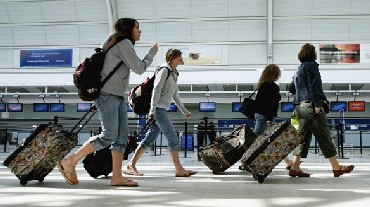 | « Back to article | Print this article |
Travelling abroad to study? Consider these tips
Suchitra Surve, Counsellor and Director of Global Education Counsel offers suggestions on what students who are travelling abroad must consider.
Studying abroad can be one of the most enriching and rewarding experiences a student can have during their years in college.
Securing an admission in an international University in itself is a big achievement and the dream of studying in a different country gives a sense of thrill and anxiety as well.
Travel planning is the first step that students have to start working out. For many, this must be the first time they are travelling to a foreign country all by themselves.
However studying abroad requires a student to be careful about certain things before leaving.
When you travel internationally, it can be an overwhelming task. To think of all the things you may need while you are away from home may never end.
You don't want to take too much, but you also do not want to take too little and have to purchase every day things overseas where you may have to pay much more than they are worth.
Here's a quick glance of what you need to know before leaving your home country
Click NEXT to continue
Travelling abroad to study? Consider these tips
While packing your bags
- Carry your offer letter of the University you are going to study at, along with sufficient passport size photographs in multiple copies which might be required for various reasons.
- Make two copies of your passport identification page. This will facilitate replacement if your passport is lost or stolen.
- Carry appropriate shoes and clothing as per the climatic conditions of the country.
- For festive occasions, carry a set of traditional attire and accessories from your country.
- Make sure you keep basic essentials like toothpaste, toothbrush, towels and other things in your cabin baggage, pair of clothes and so on.
- Before you go abroad, consult your doctor regarding any personal medical needs. If you are carrying medicines, which are not the general ones then carry doctor's prescription for the same and make sure that they are not banned in the country of your visit.
- It is essential that students have medical insurance that would cover a medical emergency abroad.
- Carry enough snacks and ready-to-eat meals till you get used to the routine.
- Jot down all names, phone numbers, postal and e-mail addresses of campus people and offices with which you might have to contact during your time away.
- Keep a check on the weight of your baggage. You will have to pay extra money if your baggage is over weight.
- Mark your entire luggage with your name, address and have a unique identification to avoid unwanted exchange.
- Even an international demand draft usually takes about 2 - 4 weeks to get encashed so carry enough appropriate currency to last you for the first month or so.
- Maintain copies of your itinerary, passport and visas with family, so you can be contacted in case of an emergency.
Click NEXT to continue
Travelling abroad to study? Consider these tips
At the airport
- Reach the airport on time.
- It may take more than 10-15 hours to reach your destination and therefore it is essential to be comfortable with your dressing. Ensure that the shoes and clothes you are wearing during travel are comfortable enough.
- Carry the essential and mandatory documents in your carry-on bag and not in your luggage.
- Do not leave your luggage unattended.
- Do not carry packages for any stranger as the packages could contain prohibited items.
- Do not share or produce your documents to anyone unless the person shows you some form of identification and authorisation to receive them with an appropriate reason.
- Understand the immigration rules and fill in the appropriate forms as well at both the points departure and arrival.
Click NEXT to continue
Travelling abroad to study? Consider these tips
After reaching the destination
- Reach your destination at least two days in advance to get over the jet lag and to acclimatize yourself.
- Familiarise yourself with local laws and customs of the countries to which you are travelling. Remember that while in a foreign country, you are subject to its laws.
- Students who wish to work part-time in conjunction with their studies or when their studies are finished should ensure that they understand the laws that apply and comply with them.
- Understand your University and its culture well. Get in touch with the International Students Office.
- You can purchase International Calling cards to make telephone calls to your family and dear ones.
- Keep a record of emergency telephone numbers of the nearest police stations, fire-brigade, hospitals and so on with you.
- In case of any trouble, contact the nearest Indian Embassy.
- Develop a plan with your family for regular telephone or e-mail contact, so that in times of heightened tension, you will be able to communicate with your parents directly about your safety and well-being.
- Avoid crowds, protest groups, or other potentially volatile situations.
Be cautious and observant not only while travelling abroad but otherwise as well so that you enjoy a safe trip.
Bon voyage!



